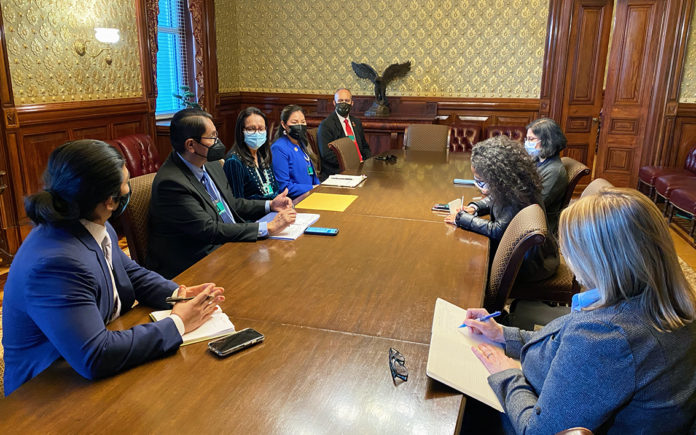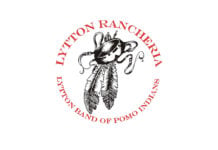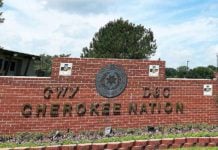
WASHINGTON, D.C. – Navajo Nation President Jonathan Nez met with White House officials, Congressional members, and federal agencies in Washington, D.C. this week, to garner support for infrastructure development, public safety facilities, veteran benefits, and health care resources for the Navajo people. President Nez also testified before Congressional members on Capitol Hill, in support of the Native American Voting Rights Act, a bill that upholds and expands voting rights for all tribal nations across the country.
“As the largest tribal nation in the country, it’s important that we continue to have our voices heard in the White House and the halls of Congress to remind leaders that the first people of this country are still here and that we will not stop advocating for what is right when it comes to voting rights, infrastructure development, public safety for our communities including our missing and murdered relatives, and many other priorities for the Navajo Nation,” said President Nez.
President Jonathan Nez, First Lady Phefelia Nez, and Navajo Nation Washington Office Executive Director Santee Lewis also met with U.S. Department of Transportation Deputy Assistant Secretary for Tribal Affairs Arlando Teller and Tribal Affairs Director Milo Booth, regarding proposed policy updates and funding sources that are needed to improve transportation infrastructure on the Navajo Nation. President Nez continues to advocate for the Nez-Lizer Administration’s white paper titled, “Diné Atiin Bahane: Navajo Road Emergence,” which requests the federal government to enact seven specific policy changes to improve the Navajo Nation’s transportation system.
Earlier this year, President Nez and Vice President Myron Lizer met with White House and the Bureau of Indian Affairs officials to advocate for the policy changes that are needed to speed up the time that it takes to finalize reviews and approvals for road projects to move forward on Navajo Nation trust lands.
President Nez was joined by Navajo Nation Veterans Administration Executive Director James Zwierlein for a meeting with U.S. Deputy Assistant Sec. for the Office of Public and Intergovernmental Affairs Stephanie Birdwell under the U.S. Department of Veterans, to request support for establishing a new federal Veterans Administration regional district that would be located on the Navajo Nation to provide service benefits closer to home and reduce the travel costs that many Navajo veterans incur commuting hundreds of miles to the nearest federal veterans offices in cities like Albuquerque, NM and Phoenix, AZ.
With over a population of over 10,000 Navajo veterans, President Nez proposed a Native American veterans center to be established on the Navajo Nation to provide federal benefits, including clinical and mental health services, to help Native American veterans with PTSD and other health care issues. In addition, he and Director Zwierlein urged the Department of Veterans Affairs to reinstate assistance for traditional healing that was previously offered through the Carl T. Hayden Traditional Healing Program. Director Zwierlein was recently selected by the U.S. Veterans Department to serve on the VA Advisory Committee on Tribal and Indian Affairs.
“We have so many of our Navajo people who step up to serve in every branch of the Armed Services and they serve honorably,” said President Nez. “I guarantee that every enrolled member of the Navajo Nation has a parent, sibling, or relative that has served or is currently serving in the military. The Navajo Nation created a trust fund specifically to help our veterans and we established offices in every Navajo agency, but we need the federal government to step up and provide the federal benefits that were promised for the service and sacrifices they gave for our country. With Mr. Zwierlein’s recent appointment to the federal Advisory Committee, we are very optimistic that we will see improvements.”
They also informed the federal officials of the progress of the Navajo Nation’s Veterans Housing Program, which is set to break ground on new homes for Navajo veterans in the next two weeks to provide more housing for Navajo veterans. The program is also in the process of repairing homes that were constructed between 2014 and 2017 in each of the five agencies on the Navajo Nation.
In meetings with White House officials, President Nez requested support to construct new public safety and justice facilities to replace aging buildings in the communities of Shiprock, NM and Window Rock, AZ. He also spoke about the Navajo Nation’s ongoing work with Congressional members to secure more funding to continue extending the Navajo Gallup Water Supply Project to reach more Navajo communities and homes and for increased grant funding for other water infrastructure projects through the infrastructure bill being debated in Congress.
President Nez also noted that through the Navajo Nation’s American Rescue Plan Act funding allocation, the Nez-Lizer Administration is proposing to allocate $780 million for water, power lines, broadband, housing, and bathroom additions, $350 million for direct services in communities related to education, health care, mental health, social services, detox centers, senior centers, economic development, and tourism. $220 million would be allocated for chapter projects and $100 million for enterprises. Approximately $207 million has already been approved for another round of hardship assistance for enrolled members of the Navajo Nation.
First Lady Nez, who is originally from Big Mountain located in the Hopi Partitioned Lands, also spoke about the need to appoint a commissioner for the Office of Navajo Hopi Indian Relocation, to revitalize efforts to develop communities and opportunities for Navajo people who are affected by the relocation. She spoke of the need to develop health care and child care services, schools and colleges, and other services for youth and families.
In addition, President Nez and the First Lady requested more support, resources, and coordination with the Navajo Nation Division of Public Safety to help locate and safely return missing Indigenous relatives and support for the passage of the Radiation Exposure Compensation Act Amendments of 2021.
“The federal government has a trust responsibility and treaty obligation to the Navajo people dating back to 1868 that includes funding and support for public safety, health care, and other critical services,” said President Nez. “The Navajo Nation has stepped up in many ways to fund and expand direct services for our people, but we need to remind Congress and others of the obligations included in the Treaty of 1868 that was signed by Chief Manuelito and other great leaders.”












































